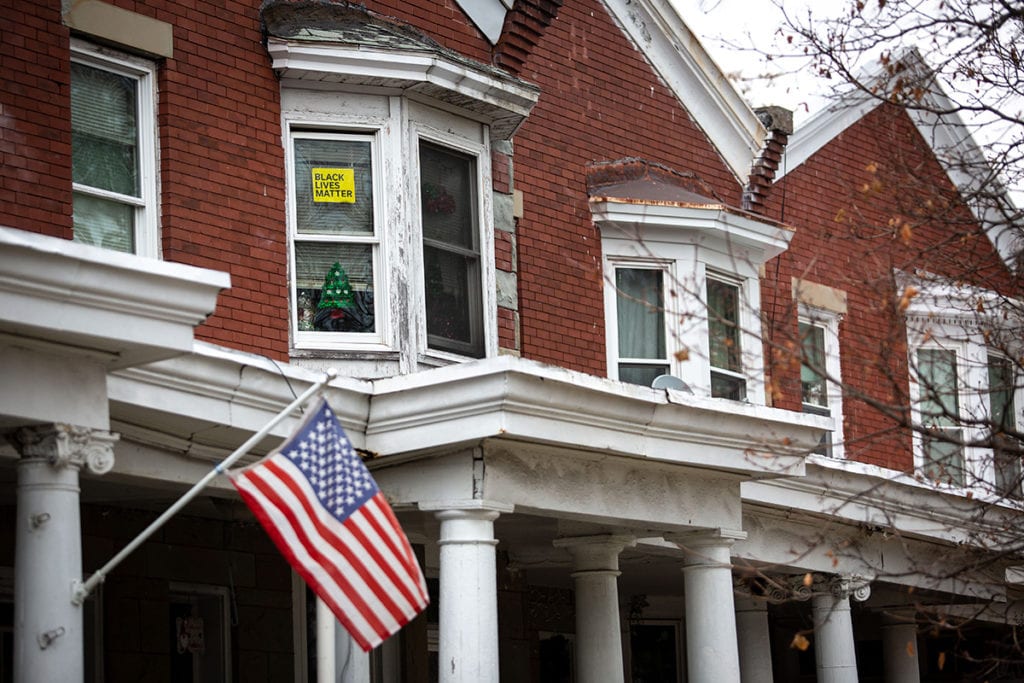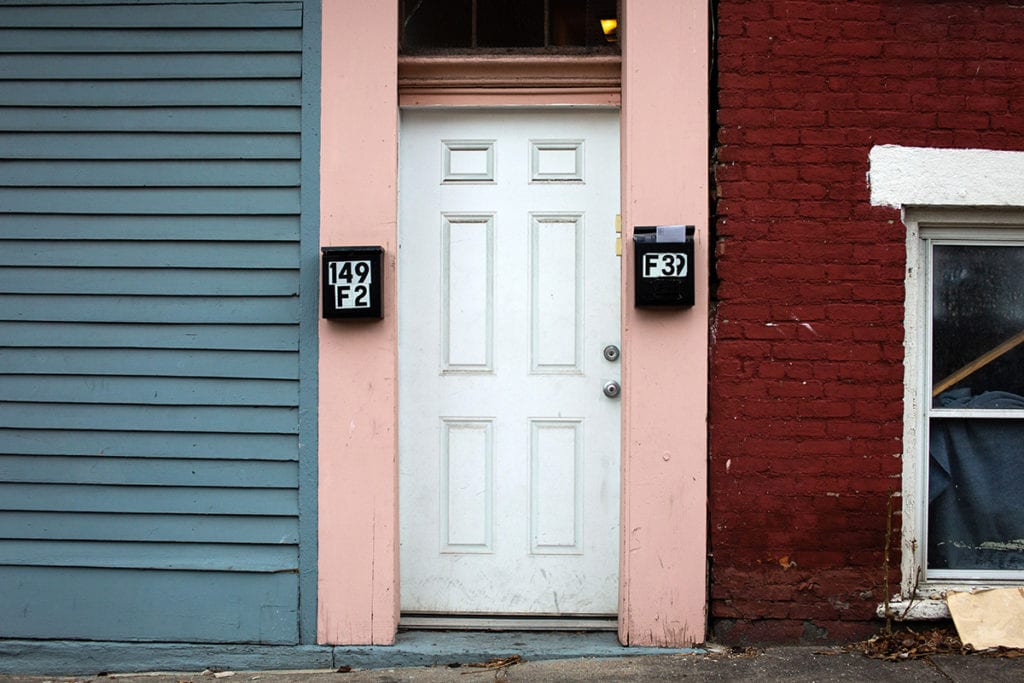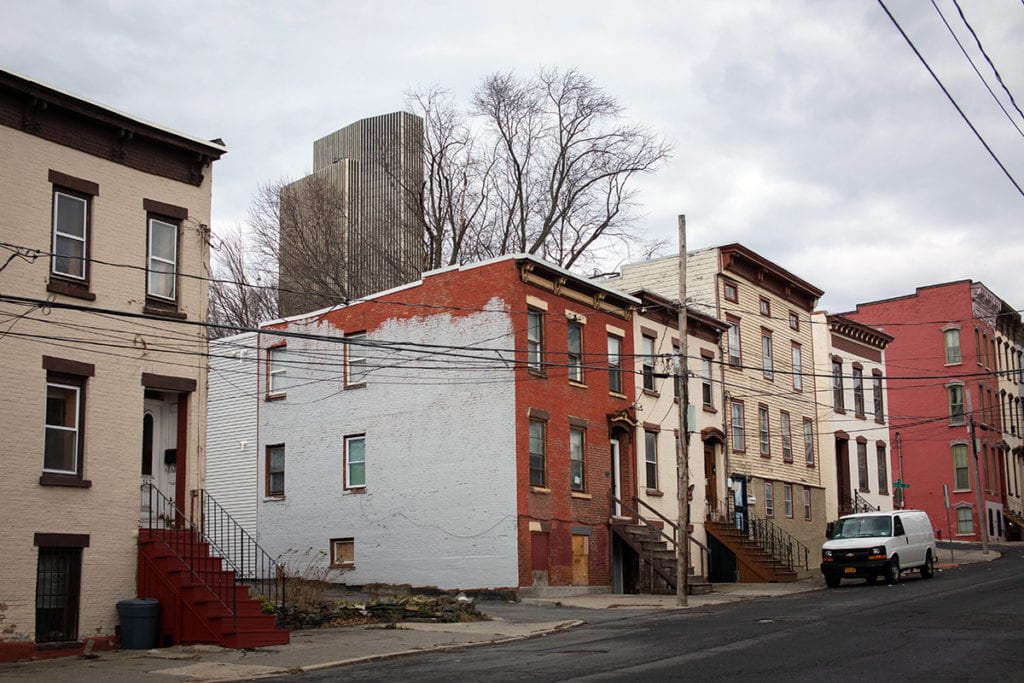
A recent Beverwyck Neighborhood Association virtual meeting started with jolly compliments of holiday decorations and one attendee multi-tasking through a treadmill workout.
From there, it devolved into a conversation about removing people from their homes during a pandemic.
Setting the tone of the meeting were two officers from Albany Police Department’s Neighborhood Engagement Unit who began with updates about homicides, shootings, and robberies across the city.
According to the Safer Neighborhoods through Precision Policing Initiative, of which APD was one of 15 police departments to join in 2010, “the NEU is at the forefront of collaborating with community residents to identify problems in the community and to develop solutions.” Beat officers have participated in over 500 neighborhood meetings and events a year to work towards those goals.
Members of the neighborhood association had praise for their NEU beat officer, Salvatore Sturiale, crediting him for what they say is his role as a social worker as much as a police officer.
Sgt. Joseph Harrigan, NEU Supervisor of Beats, joined Sturiale for the meeting and compared a recent spike in vehicle break-ins to the feeding patterns of animals.
“Unfortunately criminals are like bears, once they know they are going to get fed they come back.”
He also offered up a solution that he says the police department has been advising to Grand Street landlords which they believe will aid them in civil court eviction proceedings.
“One of the things that we recommended to some of the rental companies is that you have it built into the lease that if the police are called to your apartment so many times, upon further review, that could be grounds to terminate your lease,” Sgt. Harrigan said.
Cities, including Albany, have tried to implement similar nuisance crime ordinances on their own. According to the ACLU, nuisance ordinances “label a property as a nuisance when it is the site of a certain number of calls for police or alleged nuisance conduct (a category that can include assault, harassment, stalking, disorderly conduct, and many other kinds of behavior).”
For landlords, “the only thing it’s going to keep out are people that are nuisances,” Sgt. Harrigan told the meeting attendees.
However, in practice these terms often keep out vulnerable people who have fewer resources — including disproportionately affecting communities of color, victims of domestic violence, and those suffering from mental illness.
According to real estate website Niche.com, the Beverwyck neighborhood of Albany consists of 80% rental units, and over half of its residents are Black or Hispanic. The neighborhood association didn’t appear to have any Black residents on the board.
Meanwhile, Sgt. Harrigan recommended 10 police calls as being grounds for lease termination. It drew laughs from members of the association board.
“10 times seems excessive,” one member said. “I was thinking once or maybe twice.”
This year, APD has responded to 3,838 calls for service in the Beverwyck neighborhood. Of those, only three were labeled as strictly non-emergency nuisances while 257 were for domestic disputes.
Luke Grandis, Statewide Organizer with VOCAL-NY, says these recommendations go against police reform progress and the recommendations of a recently released racial bias audit — and the timing couldn’t be worse.
“Especially during a housing crisis when people are actively being evicted and kicked out of their homes during the winter in the midst of a pandemic with nowhere to go as shelters are overcrowded and the homeless can’t quarantine or stay home, we need stronger housing protections, not loopholes that allow landlords to discriminate,” Grandis said.

Housing advocates say that linking evictions to police responses in over-policed neighborhoods can further exacerbate the social issues that impact vulnerable populations.
Laura Felts, Executive Director of United Tenants of Albany, says they see most illegal evictions happen to residents of transitional housing, including those recovering from substance use or returning from incarceration.
“I’m grateful in some ways that evicting somebody for lease violation does put the burden of proof on the landlord to really prove that there’s been some material non-compliance,” Felts said. “But anything that’s giving a landlord some grounds to sue a tenant who very well might be a victim of something, or especially if that it’s just arbitrary police calls…”
“I like to sort of hope that it’s clear enough that that’s a violation of the First Amendment,” she added.
In sociologist Matthew Desmond’s 2016 Pulitzer-Prize winning book ‘Evicted’, the author explains the Milwaukee Police Department’s involvement in that city’s housing crisis. According to Desmond, in the years 2008-9 the MPD issued nuisance property citations to residential properties every thirty-three hours, with the most popular citation being a catch-all “trouble with subjects.” The third most common citation was for activity related to domestic violence. Those incidents outnumbered all other kinds of assaults, disorderly conduct charges, and drug-related crimes combined.
Cities across the country have failed in the past to carry out evictions based on police responses — and many have resulted in ACLU lawsuits. In 2020, the city of Bedford, Ohio repealed their ordinance and paid $350,000 in settlement money to a woman who was evicted from her home after making calls to the police herself.
According to the ACLU: “These nuisance ordinances violate free speech, due process, equal protection, and fair housing guarantees. But they aren’t just illegal, they’re bad policy. While cities might intend to prevent crime with these laws, the reality is that these ordinances result in housing instability for already vulnerable individuals and reduce trust between communities and law enforcement.”
Others see issues with the police being so closely involved with private lease agreements to begin with.
Grandis said they’ve seen it used as a tactic to further a system of mass incarceration. “Probation and parole officers target people all of the time with the intention to find a way to produce police contact to be considered a technical violation.”
By also having that connected to leases, Grandis says “people will be at risk of losing their homes at an egregious rate.”
In an article published in The Atlantic this March, Alexis Karteron, an associate professor and the director of the Constitutional Rights Clinic at Rutgers Law School, said, “It is troubling to think of police departments turning landlords into their agents, engaging in crime-control activities with them.”
Felts says that United Tenants often gets tenants asking for them to call their parole officers when they are facing eviction.
“It really is a difference between them becoming incarcerated again,” she said.

Albany has its own nuisance ordinance on the books — the Police Chief is allowed to step in after a property racks up a certain amount of “points” in a period of six months or one year. The points stem from violations of various articles of penal law and include an opportunity for a formal hearing. Albany Housing Authority tenants can also be evicted if a member of the household commits a crime and “if the arrest is for a section of the law listed as a violation of your lease.”
However, their policy states that “tenants have due process for a fair hearing and follow up relief in city court.” These processes typically drag out in court and make evictions more difficult for landlords, which may be why the city of Albany has seldomly gone through with it.
Representatives from Albany Mayor Kathy Sheehan’s office did not respond to requests for comments about how involved city police officers are with landlords regarding lease terms.
By encouraging nuisance terms on private leases, police departments could seemingly circumvent the legality of such city ordinances that have been challenged in court elsewhere in the country and help set private landlords up for better chances in housing court.
According to New York state law, landlords can seek evictions “if a tenant significantly violates a substantial obligation under the lease (such as using the premises for illegal purposes, or committing or permitting a nuisance).”
Felts said that by the time it gets to a judge, they often side with a victim over a landlord. She recalled a recent case where United Tenants assisted a victim of domestic violence who had to appear in court to avoid an eviction — the tenant ultimately won.
“By virtue of being a victim, you can subsequently be a so-called nuisance,” Felts said. “But that’s not your fault.”
However, she recalled the hours it took in court and the toll it took on the victim.
“She had to relive all of her domestic violence experiences to be able to prove to that judge I am in fact a victim,” Felts said. “It was awful.”
- Protomartyr and Fashion Club at No Fun – June 13, 2024
- Sheer Mag at No Fun – May 5, 2024
- Annual cover show brings Oasis, Queens of the Stone Age to Troy – February 17, 2024

